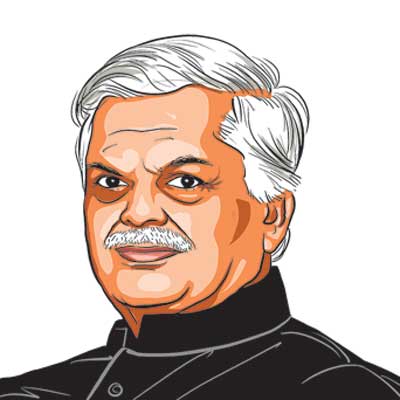Opinion Compromise is no crime
AAP must know that politics is the art of the possible,more so in the coalition era.
AAP must know that politics is the art of the possible,more so in the coalition era.
A revolution,said Mao Zedong,is not a dinner party. Nor is running a government. Mahatma Gandhi understood well the difference between leading a popular upsurge and heading a popular government. He chose to stay out of the latter,having accomplished the former.
In fact,Gandhiji went to the extent of virtually seeking the dissolution of his instrument of national mobilisation when he said,India having attained political independence through means devised by the Indian National Congress,the Congress,in its present shape and form,that is,as a propaganda vehicle and parliamentary machine,has outlived its use.
In so saying,the Mahatma drew pointed attention to the difference between a movement and a party of government. It is the facilitation of this transition from one to the other that Jawaharlal Nehru,Sardar Vallabhbhai Patel and all other Congress leaders in government enabled. This is the challenge before Delhis Aam Aadmi Party (AAP). Can the party stop thinking and behaving like a propaganda vehicle and become a party of governance and of government?
The AAP has come forward with an 18-point charter on the basis of which it will accept outside support to form a government. There are two issues with this political manoeuvre. First,coalition building requires compromise and cannot be on the basis of the demand for full acceptance of ones unilateral wishes. Second,there are many demands in the list that an AAP government can go ahead and implement through administrative action without seeking legislative approval.
Consider the list of demands. Of the 18,the AAP can legitimately seek a political allys support for the granting of full statehood to Delhi (a demand that former Congress Chief Minister Sheila Dikshit has herself made on many occasions),for passing the Jan Lokpal Bill in the Delhi Assembly and for legislative regularisation of unauthorised colonies. Most of the other demands require administrative action on the part of the Delhi government that an AAP cabinet can authorise.
For example,the auditing of power companies,proper metering of power charges and reducing power rates are all administrative actions. Ensuring access to drinking water to all is again something that a good government ought to prioritise and do on its own,though AAP leader Arvind Kejriwals track record on the reform of Delhis water policy has been a negative one. As for making 700 litres of water available free of charge,it is up to the Delhi government to finance it. Offering pucca homes on easy terms to occupants of slum colonies and the construction of public toilets also involves a financial outgo and an AAP government can raise the required finances to implement this promise.
Ending the contract labour system in the Delhi government,improving the conditions for trade and industry in the capital by offering better road,power and water facilities,not allowing foreign direct investment in multi-brand retail within Delhi state and a policy on land acquisition are all within the purview of a duly constituted government. The AAP has a list of proposals with respect to school education and public hospitals that can also be implemented by the state administration.
There are demands with respect to tax policy and judicial reform for which any state government will have to persuade the Central government and other state governments to act. Delhi is not an island unto itself but a part of the federal system. While the AAP can legitimately demand that a party offering it support sign on to these demands,no state government can take the Centre and other states for granted in making the demands it makes.
Among other demands,while the Delhi government can certainly end what the AAP dubs as VIP culture with respect to all its functionaries,how can the state government of Delhi impose its will on the Central government or other state governments,whose representatives live in and visit New Delhi?
The AAPs demand for the establishment of swaraj in Delhis neighbourhoods sounds good in theory,but it is the kind of demand that requires detailing out so that the nations capital does not get further ghettoised into enclaves,mohallas and villages,and can evolve in an integrated manner.
Having stated what an AAP government would like to do in office,it is obligatory that the party also educates the public about the fiscal burden of implementing these promises. The AAP cannot be irresponsible like other populist parties that only tell the voters what subsidies and freebies they will offer once in power without specifying the cost of such commitments and the means of fiscal mobilisation. How would the AAP be different from other parties if it also imitates their fiscally irresponsible populism?
The AAPs ideologues,like psephologist Yogendra Yadav,have,for over a decade,repeatedly reminded television viewers that Indian democracy is now decisively in the coalition era. Politics has always been the art of the possible and more so in the era of coalitions. And,as any student of politics knows,coalitions require compromise. Compromise is not a crime.
The BJP has taken the understandable view that it will not form a government given its numbers. In 1996,Atal Bihari Vajpayee was in fact criticised by many political parties and commentators for trying to form a government without having the numbers. By the same token,the BJPs decision in Delhi not to stake claim is a perfectly understandable tactic.
The AAP,however,has been offered outside support by the Congress,so it has the numbers. Moreover,the popular mandate in Delhi can,in fact,be interpreted as being for the AAP given its spectacular electoral performance. While both the BJP and the Congress saw a decline in their vote share,the AAP has been the rising star. It owes a duty to its supporters to form a government and see to what extent its promises can be realistically fulfilled.
The writer is former media advisor to Prime Minister Manmohan Singh and former chief editor,The Financial Express
express@expressindia.com





